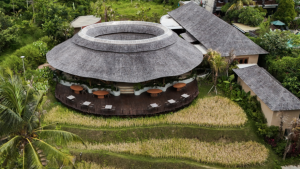The SafariSeat is a groundbreaking all terrain wheelchair designed specially for people in developing countries.
In East Africa alone, one in every 200 people is in need of a wheelchair and struggles to fulfil their everyday needs. But the wheelchairs we recognise in more developed parts of the world are not suitable for those living in rural communities. Uki’s innovative new design for an all-terrain wheelchair called the SafariSeat is hoping to change this.
In rural areas people with disabilities have to battle with sand and dirt roads instead of pavements, and wheelchairs need to be significantly more rugged. Made from bicycle parts and an open-source design, the SafariSeat is a low cost, all-terrain wheelchair designed for people in developing countries.
The SafariSeat is able to roll along rough ground that would be inaccessible in an ordinary chair. Using a mechanism that mimics car suspension, all four wheels remain on the ground at all times for maximum stability. It is propelled with pump levers that are designed for maximum power, speed and efficiency. The seat is also designed to reduce pressure and help stimulate blood flow.
SafariSeat have launched a crowdfunding campaign on Kickstarter to raise money to build as many chairs as possible and develop the open source manual.
Janna Deeble, SafariSeat’s designer, grew up in Kenya and met a man named Letu who lived with his family in an isolated community and suffered from polio. With no access to healthcare, suitable wheelchairs or any of the assistance that people in the west take for granted, Letu had to crawl to move around and was totally dependent on others.
It was only when Deeble was wheelchair bound himself for a few months while recovering from an accident that he fully understood the frustrations and struggle that disabilities can cause, even in a supportive environment.
Letu now has one of the first SafariSeats, and has been able to use it to teach his son the ways of the Samburu.
SafariSeat is the first project from Uji, a Nairobi-based social enterprise determined to make a difference. Their goal is to design tools that help people break free from the poverty cycle and avoid a culture of dependency. Uji is led by a team of young designers: Janna Deeble, Cara O’Sullivan, James Seers and Bertie Meyer.










